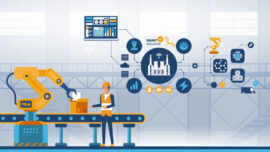Valued at USD 56.15 billion in 2022, the global home automation market is projected to skyrocket to around USD 207.23 billion by 2032. This represents a Compound Annual Growth Rate (CAGR) of 14% from 2023 to 2032.
Role of Internet of Things (IoT)
IoT technology serves as a key in the home automation landscape, bridging an array of smart devices like thermostats, lighting systems, appliances, and security systems. This interconnectivity creates a harmonized ecosystem where smart devices can interact, share data, and execute automated tasks, such as temperature adjustments or lighting controls.
The integration of IoT has not only sped up technological advances but also enriched a rapidly growing portfolio of smart products and services. This ever-evolving ecosystem continually offers consumers a broad spectrum of choices, thereby stimulating the overarching growth of the home automation industry.
Key Drivers of Market Expansion
One of the primary engines driving this growth is the evolving consumer preference fueled by an increased awareness of the benefits of smart homes, including convenience, energy savings, and security. The rising demand for smart home solutions that enrich daily life and offer practical benefits has been a cornerstone in propelling market growth.
Simultaneously, technological advancements in areas such as wireless communications, IoT, artificial intelligence (AI), and voice recognition have paved the way for more sophisticated and seamless smart home systems. These technological strides have elevated the functionality, reliability, and compatibility of smart home products, making them increasingly appealing to consumers.
Conclusion and Future Outlook
As we look ahead, the rapid expansion of the home automation market is set to continue, driven not just by technological innovation but also by shifting consumer preferences. While the sector faces challenges, including cybersecurity risks and questions surrounding data privacy, its prospects remain overwhelmingly positive. Businesses that can offer robust, user-friendly solutions stand to benefit immensely, capitalizing on emerging trends like AI integration, energy sustainability, and enhanced security features. As the boundaries of what’s possible continue to expand, the next decade promises to be a transformative period for home automation, revolutionizing not just our homes but also how we interact with the world around us.
Data Source:





